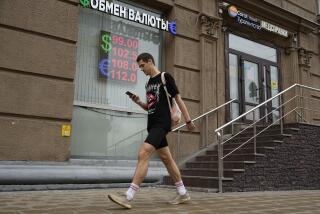Banker Gives Ruble 2 Years to Catch On : * Soviet Union: The head of Russia’s central bank says that’s how long it’ll take for breakaway republics to develop their own currencies.
- Share via
MOSCOW — As the Soviet Union’s independence-minded republics press to establish their own currencies, the head of Russia’s central bank contended Wednesday that the sheer mechanics of such a move would take at least two years--giving the central government time enough to cobble together a national economy.
Disagreement over the currency issue is one of the biggest stumbling blocks as the republics seek to work out a plan to build a new Soviet economy.
Some republics, notably the Ukraine, view establishing their own money as an integral part of shaping their new identities. But many economists warn that a plethora of currencies could make it impossible to create the “common economic space” that Soviet leaders seek.
“There is very big pressure on politicians to insist on their own currencies,” said Georgy Matyukhin, chairman of Russia’s central bank.
But he told a group of American reporters that none of the republics will have the facilities to print their own money for at least two years, during which time “what we need is to convince them of the negative consequences of introducing these currencies.”
Ultimately, he said, republic politicians will be persuaded that if they insist on going forward with their own currencies, they should be locked together with the ruble--much as the Scottish pound is with Britain’s.
The Russian central banker also predicted that the ruble could become at least partially convertible--that is, exchangeable on international markets in limited amounts for Western currencies--next year. Currency convertibility is considered one of the most crucial steps toward integrating the Soviet Union into the world economy.
But one of the country’s most influential economists offered a far more pessimistic assessment of what lies ahead. Leonid Abalkin, a former economic adviser to Soviet President Mikhail S. Gorbachev, agreed with Matyukhin that a currency managed by a single central bank was “the only reasonable way.” But that would not be the way the money system will develop, he predicted.
“In practice, the republics will do the exact opposite,” Abalkin said. “Every republic is going to try to create its own money. Every (republic’s central) bank will print money to finance their growing deficits. Within two or at most three months, the monetary system of the Soviet Union will be totally destroyed.” And if that happens, he added, the consequences could be so dire that “a new dictatorship would happen.”
While Abalkin asserted that his country would lurch one way and then another, he was confident that it would find its way to a market economy in the next five to seven years. “A sober person always goes straight; a drunkard always weaves back and forth,” the economist explained. “It takes longer to get to your goal.”
Matyukhin, the central banker, insisted that Western investment and know-how--not its financial aid--were what the Soviet Union needed most. “I am against all those huge intrusions of money from the West in the form of credits or of a stabilization fund for the currency,” he said. “Whenever I think about credits, I remember we have to pay them back.”
Many analysts have speculated that the Soviet Union’s gold reserves might be used as backing for the ruble, giving it the strength it needs to become convertible on world markets. But Matyukhin said the size of the reserves was not great enough to give the ruble value on world markets.
The size of those reserves has been one of the Soviet Union’s most closely guarded secrets. Soviet economists, lacking any other reliable source of information, generally cite the CIA’s estimate of 2,000 tons in 1989.
Matyukhin, central banker for the republic that produces most of the Soviet Union’s gold, said not even he was privy to the actual figure. When he once ventured a guess in the late 1970s, he added, “two men in suits showed up at my door and demanded to know where I was getting my information.”
He showed them his rough--and uninformed--calculations, he recalled. “They were good guys. They understood my calculations and I was left in freedom.”
More to Read
Sign up for Essential California
The most important California stories and recommendations in your inbox every morning.
You may occasionally receive promotional content from the Los Angeles Times.










